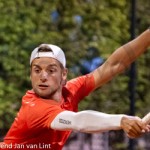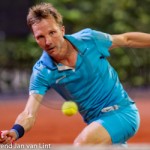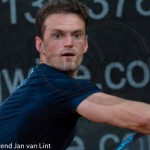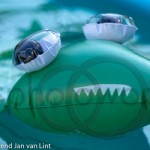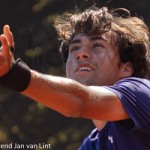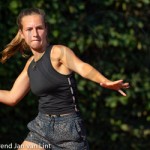Click here for the photo gallery of Arantxa Rus
How it all began
As a little girl of five years old Arantxa joined her sister Kim on the tennis court. A very good idea as she turned out to be a great talent. ‘First I just played tennis. Later I also tried some other sports, just for fun. Because it was quite busy, I soon focussed on tennis again.’ A good decision looking at her impressive results as a Junior. In 2008 she reached the quarterfinals at Wimbledon, the semi-finals at Roland Garros and she became a Australian Open Champion. This made the Dutch talent from Delft Junior world number one.
“This made the Dutch talent from Delft Junior world number one.”
Indespensable Confidence
On the WTA tour she has beaten some impressive players, like Stosur, Clijsters, Dulko, Schnyder, Goerges and Wickmayer. On the other hand Arantxa sometimes loses matches of players you would not expect. ‘Yes, at this moment my game is unstable. Last year I had a less successful season and I lost quite some matches. That influences your self-confidence. In the training I actually played quite well, but during the matches I just lacked confidence. Hopefully I will be able to win many matches in the upcoming weeks and reach my own level again.’ On the question if the Fed Cup could be a positive impulse for Arantxa she answers: ‘Yes, definitely. We train a lot with the team, the girls are nice and we work hard.’ Those who know Arantxa know that this lady always works hard. ‘But if my hard work does not pay off during the matches, that is of course frustrating.’ The Dutch player really likes presenting her country in the Fed Cup. ‘The nice thing about the Fed Cup is playing in a team. Tennis is usually such an individual sport. In addition to that it is also fun to work with such an experienced player as Paul Haarhuis. You can always learn from this.’
“Tennis is par excellence a mental sport. But if one of the other aspects is not on track, you won’t make it either.”
The mental aspect of tennis
This brings us to the mental aspect of the game. ‘Of course, your technique, physical fitness and tactical game plan are all important aspects of tennis. It is difficult to tell which one is more important. Still, tennis is par excellence a mental sport. But if one of the other aspects is not on track, you won’t make it either. At this moment I mostly work on my self-confidence. I know I can play good, I have done so in the past. I just need to really believe in myself.’ This feeling sounds probably familiar to players who go through a period with less results than aimed for. It is a challenge to find your way up again. How Arantxa does this? ‘I talk a lot to my coach Hugo Ekker. Of course he sees that it is mostly my confidence that we need to work on. Although, we also worked on some technical aspects like my service. Still, my confidence is the most important thing to focus on. I am glad that the end of last season was positive, winning many matches again. I have to focus on that and realize that I can do it!’
Keep calm and play tennis
Known to be ‘as cool as a cucumber’ Arantxa is able to react extremely calm on the behaviour of her opponents on court. A good illustration of this was her calm reaction on the theatrical performance of Goerges during her third round match at Roland Garros in 2012. On the question if this calmness could help her to win her confidence back, Arantxa answers that in her opinion these things are unrelated to each other. ‘Indeed, I do not care about the behaviour of others on court. I don’t feel any pressure based on former results. I don’t really look back on that. I just had a less successful period and I hope to fight my way back in the top 100 this year.’
“I don’t feel any pressure based on former results. I just had a less successful period and I hope to fight my way back in the top 100 this year.”
A few short questions
How does your ideal Saturday look like?
‘Than I’m definitely at home, because abroad you don’t have any special ‘Saturday’ feeling. In the morning I would train nearby and after that I would like to spend time with my family and friends. For example go out lunching or shopping in Den Hague. I just like to relax on these days at home and do not prefer a busy schedule at all.’
A dog or a cat?
‘A dog. My sister has one and I see it often and that is always fun. So I choose the dog.’
A book or a movie?
‘A movie.’
Vacation: beach or cities?
‘As I normally get a lot of exercise during the day I really want to relax during my holiday. So I would spend my holiday at the beach.’
What would you do, if you would not be a professional tennis player?
‘That is a difficult question. Actually, I can’t imagine a live without tennis.’
And to put it differently: what would you like to do after your tennis career?
‘I did think about it once, but actually I do not know that yet. It doesn’t necessarily has to be something with tennis. I don’t want to be a coach for example.’
Because of the travelling?
‘No, not really. I would like to spend my ideal Saturday at home. But I’m not saying I hate being on the road. Travelling gives me a lot of variation in live and you can see much of the world. I just don’t know yet what to do after my career. Luckily I still have time to think that over.’
And so she has. Let’s hope she will find her way back in the top 100 again and will be able to play the best tennis of her career before having to worry about questions like that.






